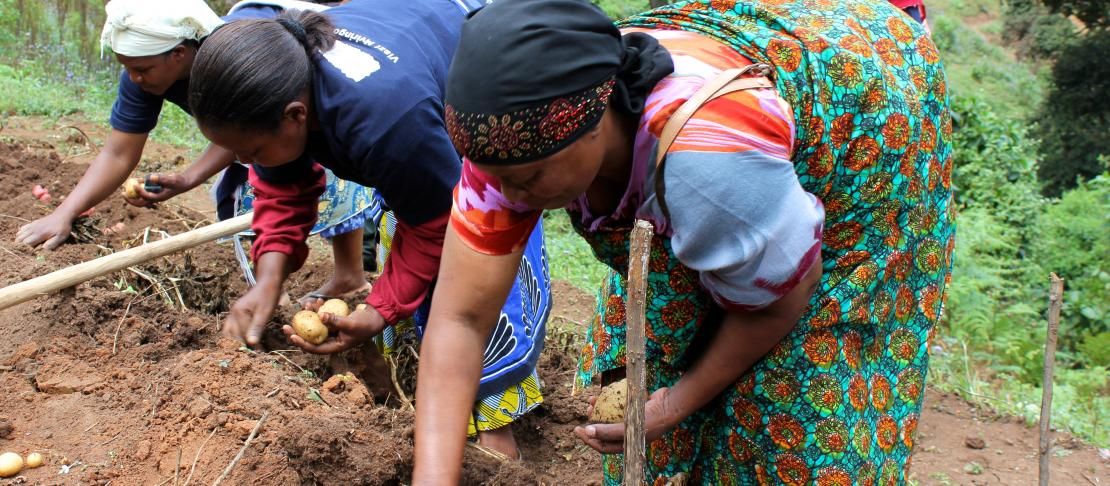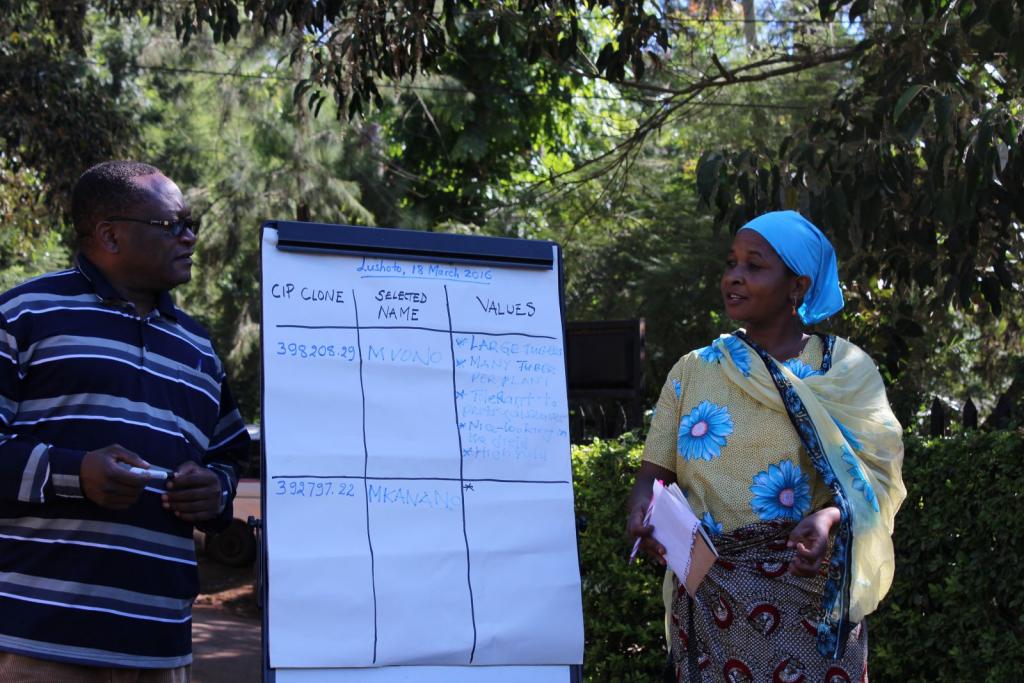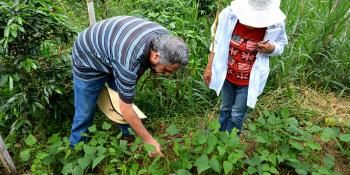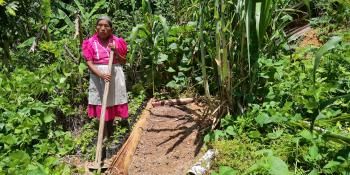Addressing climate risks through improved potato production in Lushoto Climate-Smart Villages, Tanzania

Farmers in Lushoto select better potato varieties and receive training on improved production practices to enhance their crop management.
To address climate-related risks in Lushoto District, Tanzania, the CGIAR Research Program on Climate Change, Agriculture and Food Security (CCAFS) has coordinated a partnership of local government and research organizations. The International Potato Centre (CIP) and Tanzania’s Selian Agricultural Research Institute (SARI) are working with the Lushoto District Council in Tanga Region to increase farmers' resilience to climate change.
In 2011, farmers did not think it was possible to grow potatoes three times a year. The potato farmers could not plant more than one crop cycle per year due a lack of suitably adapted varieties, knowledge of improved agronomic practices, and viable, high quality seed. Six years later, thanks to positive changes in these three areas, they now grow potatoes in three cycles per year, using early two early-maturing varieties known as Shangi and Unica (Mkanano). These varieties take 90 days to reach physiological maturity, tripling the production and benefits for a 12-month period.
Better adapted potato varieties, more yield, more farmers involved
“Six years ago, we were growing potatoes only once per year during the long rainy season of March to May. Local varieties like Kidinya were attacked by diseases and we could only plant it once a year, to avoid drier months when disease pressure was high. The partnership facilitated by CCAFS guided us to form savings and credit cooperative organizations, and through them we co-evaluated better-adapted potato varieties that suit our needs, such as Shangi and Unica (Mkanano), which take 90 days in the field, Asante, which takes 100 days, and Mvono, which takes 120 days,” said young farmers Florian Vitus and Mputa Mputa of Kwesine and Kwekitui villages. The improved varieties are not only high yielding but also have resistance to late blight disease and are able to withstand high temperatures.
The potato participatory varietal selection started in the administrative villages of Kwesine and Boheloi in early 2014 and involved 50 farmers.On the first attempt, farmers who planted potato varieties meant for consumption tripled the yield, from 7 tons per hectare per season for local varieties like Kidinya, to 24 tons for Asante, 29 tons for Shangi, and 32 tons for Unica (Mkanano) varieties. Farmers who chose to grow the potatoes for seed production but not consumption also tripled their yield. For example, the Asante variety yielded 18 tons per hectare per season for the seed potatoes compared to 5 tons per hectare per season for the local Kidinya variety. This yield doubling effect energized the farmers, and the message spread rapidly. Within six months, the adjacent administrative villages of Maringo, Kwekitui, and Milungui had embraced the co-evaluation trials, involving 135 farmers. Two years later, by the first rainy season of 2016, more than 1,000 farmers were planting the Asante variety in Lushoto.
Production costs for the improved varieties also decreased, because farmers were trained in improved practices. From the selection of planting materials, to planting, pest and disease control, harvesting and post-harvest handling, improved practices were undertaken correctly by over 70% of the farmers. Moreover, due to varietal resistance to late blight and timing of planting, the use of pesticides by the farmers was drastically reduced, further reducing the cost of production. With the use of climate information that involves a combination of both indigenous knowledge and scientific weather forecasting by the Tanzania Meteorological Agency, Lushoto farmers can now plant the early maturing potatoes three times a year.

Participatory naming of CIP potato clones by farmers in Lushoto. Photo: D. Harahagazwe (CIP)
Access to high quality, viable seeds
Lushoto potato farmers are now linked to the quality declared seeds (DQS) program of the Tanzanian government, which seeks to empower farmers who face challenges with accessing high quality viable seeds. The QDS project involves multiplying seeds at village level, using select trained farmers who grade the seeds based on uniformity in size. QDS seeds are presumed to be free of deadly diseases, like bacterial wilt, which causes extensive losses. Within Lushoto District, 41 farmers, including 15 women, have been certified by the Tanzania Official Seed Certification Institute (TOSCI) as potato QDS multipliers. This is one of the highest concentrations of QDS farmers for potatoes within a district in the northern part of Tanzania. Their farms range from 0.25 to 1 hectare in size and the seeds that are produced are sold in nearby villages.
Diffused light storage of potato seed
Lushoto farmers are using the diffused light storage (DLS) technology, which is a low-cost method of storing seed potatoes developed by CIP. DLS uses natural indirect light instead of low temperature to control excessive sprout growth and associated storage losses. The basic criteria for a DLS structure include an insulated roof, translucent walls, and adequate ventilation. The units are built with a combination of timber, corrugated iron, plastic sheets, and fly screen. In Lushoto, the QDS farmers store between 1 to 2 tons of seed potatoes, and DLS has been useful in extending potato storage life and therefore maintaining their productivity.
New partnerships for Lushoto potato farmers
New partnership opportunities have emerged for the Lushoto community. Farmer exchange visits took place between 15 and 21 December 2016, when 153 potato farmers from West Kilimanjaro region, including 53 women, travelled to Lushoto for a one-week farmer learning tour from their Lushoto peers. Apart from the knowledge exchange, trade ties were formed through which the QDS Lushoto farmers will supply the farmers in other parts of northern Tanzania, such as the Kilimanjaro, Meru, and Arusha regions. The farming learning visits to Lushoto are ongoing.
In addition, another 40 farmers, including 15 women, have been recruited into a project called Calories and Household Income in Potato Subsector (CHIPS), which is funded by Kilimo Trust, a non-governmental organization. From March 2018 onwards, CHIPS is linking Lushoto farmers to high-end markets where they can fetch premium prices. Apart from the savings and credit cooperative organizations (SACCOS), another major local farmer organization linked to the project is the Usambara Lishe Trust, comprising 3,000 farmers.
Read more:
- Info note: Climate-smart villages and progress in achieving household food security in Lushoto, Tanzania.
- Booklet: Stories of Success: Climate-Smart Villages in East Africa.
- Media coverage: Tanzania Sets Record in Potato Research, to Release Improved Varieties | The Citizen.
John Recha and Maren Radeny work with the CGIAR Research Program on Climate Change, Agriculture and Food Security (CCAFS) East Africa Regional Program.
Stephen Kuoko works with the Selian Agricultural Research Institute (SARI) in Tanzania.


